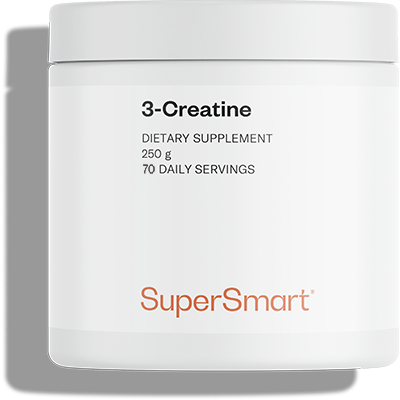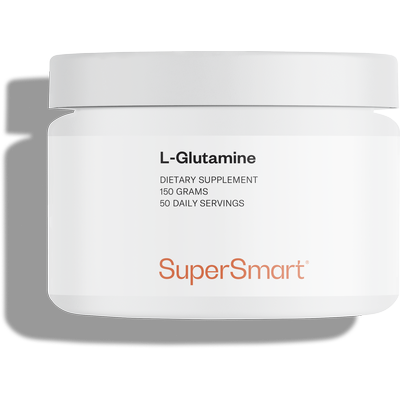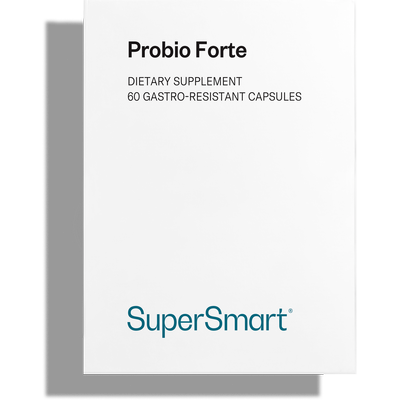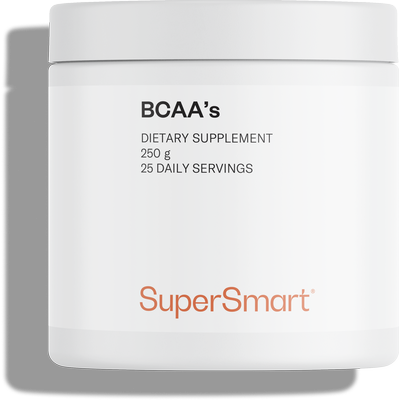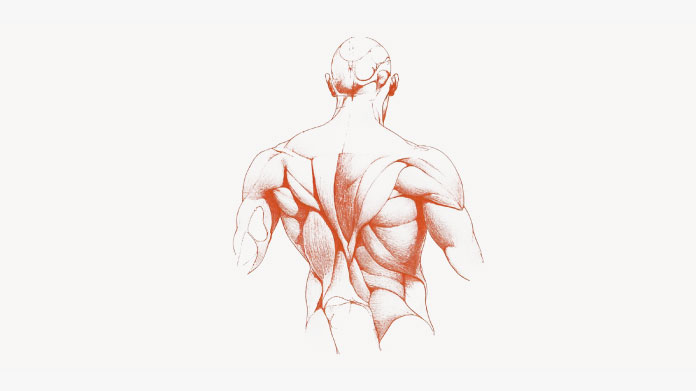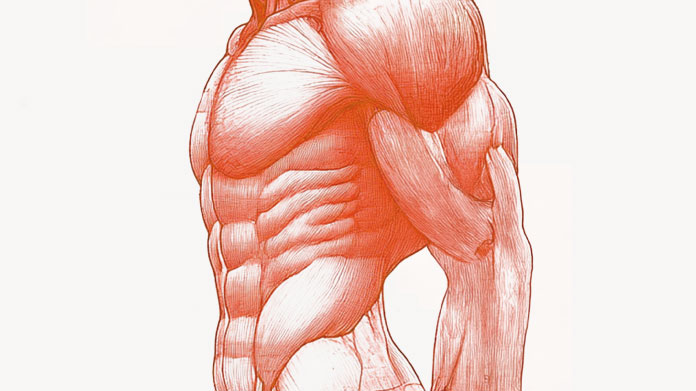Glutamine: role, benefits & dangers
Well-known to sportsmen and women, glutamine is an amino acid with a wide range of benefits. Here's everything you need to know about it.

What is glutamine?
Glutamine is an amino acid naturally synthesised by our bodies.
It is found in high concentrations in the blood, muscles and certain organs, particularly the intestine.
It is involved in many biological functions, including cell metabolism.
In addition to its physiological synthesis, the body also obtains it from a variety of foods:
- meat and fish;
- eggs;
- dairy products;
- pulses (lentils, chickpeas, beans, tofu, etc.);
- green vegetables (spinach, broccoli, Brussels sprouts, etc.);
- certain wholegrain cereals (wheat, brown rice, rye, oats, etc.);
- nuts and seeds.
Glutamine is also valued as a dietary supplement in sports nutrition and natural health.
The benefits of glutamine for the body
The benefits of glutamine for bodybuilding and sports enthusiasts
Glutamine is involved in the synthesis of proteins by our bodies (1).
By supplying them with nitrogen, it enables the cells to produce the proteins needed for muscle recovery and repair after intense effort.
This amino acid is therefore well known to sportspeople, who can take it as a supplement when they fear overtraining, for example.
Glutamine also serves as a source of energy for various cells in the body.
This is why glutamine requirements increase during periods of stress or significant physical exertion (intense effort, convalescence, illness, etc.).
Having optimal levels of glutamine helps to support the body's proper functioning, preserve muscle mass and prevent intense fatigue.
The benefits of glutamine for the proper functioning of the immune system
Among the cells for which glutamine serves as a source of energy are certain immune system cells (lymphocytes and macrophages) (2).
It enables them to multiply more efficiently and fulfil their defensive functions.
The benefits of glutamine for the intestines and digestive health
Glutamine is an important source of energy for enterocytes, the cells that make up the intestinal wall.
It promotes their healthy renewal and proper functioning.
By helping to preserve the integrity of the intestinal barrier (3), it helps to maintain a healthy intestinal environment and a balanced microbiota.
In doing so, it helps to limit intestinal permeability and thus the passage of pathogens, toxins and undesirable substances into the rest of the body.
The benefits of glutamine for the skin and hair
Because of its role in cell regeneration, glutamine is thought to contribute to healthy skin and hair.
As an essential precursor in protein synthesis, it supports the renewal of skin cells and the keratin that makes up hair.
By providing the nitrogen needed to manufacture other amino acids, it is thought to contribute to the formation of healthy hair strands(4).
What's more, thanks to its support for immunity, it helps to limit inflammation and plays a role in the natural protection of the skin and scalp against external stressors.
What happens when we don't produce enough glutamine?
Although the body produces glutamine itself and also obtains it from a balanced diet, it can be insufficient in certain situations:
- during periods of physical or psychological stress;
- during prolonged or intense physical effort;
- during convalescence (after injury, surgery, long-term illness, cancer, etc.);
- in the event of infection, chronic inflammation or digestive problems.
In these situations, it may be advisable to increase your intake of foods containing glutamine, or even to take a glutamine supplement from time to time.
When doing so, it's advisable to opt for a quality-controlled supplement that provides an adequate supply of glutamine (such as L-Glutamine, which provides 3g of glutamine a day).
To maximise the effects of glutamine in athletes, it can be combined with creatine (5) (found in our 3-Creatine formula, which combines 3 active forms) and branched-chain amino acids (6) (like those in our BCAA's supplement). These molecules are renowned for supporting sports performance and muscle recovery.
In the case of digestive problems, it may also be useful to combine glutamine with probiotics to help balance the intestinal microbiota (our Probio Forte complex combines 5 carefully selected strains).
What are the dangers and side effects of glutamine supplementation?
Glutamine supplementation is generally well tolerated.
However, at high doses, it can cause digestive problems (bloating, nausea, temporary abdominal pain).
These effects are rare and most often linked to inappropriate dosage.
Furthermore, it is generally advised not to take glutamine supplements to enhance sporting performance if you have serious liver disease, kidney disease or psychiatric disorders (7).
If in doubt, it is strongly advised to seek the advice of a health professional before considering supplementation.
Apart from these specific factors, the risk of undesirable effects is considerably lowered as long as the dosage recommended by the food supplement manufacturer is respected.
SUPERSMART ADVICE
References
- Cruzat V, Macedo Rogero M, Noel Keane K, Curi R, Newsholme P. Glutamine: Metabolism and Immune Function, Supplementation and Clinical Translation. 2018 Oct 23;10(11):1564. doi: 10.3390/nu10111564. PMID: 30360490; PMCID: PMC6266414.
- Córdova-Martínez A, Caballero-García A, Bello HJ, Pérez-Valdecantos D, Roche E. Effect of Glutamine Supplementation on Muscular Damage Biomarkers in Professional Basketball Players. 2021 Jun 17;13(6):2073. doi: 10.3390/nu13062073. PMID: 34204359; PMCID: PMC8234492.
- Kim MH, Kim H. The Roles of Glutamine in the Intestine and Its Implication in Intestinal Diseases. Int J Mol Sci. 2017 May 12;18(5):1051. doi: 10.3390/ijms18051051. PMID: 28498331; PMCID: PMC5454963.
- Wang G, Sweren E, Andrews W, Li Y, Chen J, Xue Y, Wier E, Alphonse MP, Luo L, Miao Y, Chen R, Zeng D, Lee S, Li A, Dare E, Kim D, Archer NK, Reddy SK, Resar L, Hu Z, Grice EA, Kane MA, Garza LA. Commensal microbiome promotes hair follicle regeneration by inducing keratinocyte HIF-1α signaling and glutamine metabolism. Sci Adv. 2023 Jan 4;9(1):eabo7555. doi: 10.1126/sciadv.abo7555. Epub 2023 Jan 4. PMID: 36598999; PMCID: PMC9812389.
- Wax B, Kerksick CM, Jagim AR, Mayo JJ, Lyons BC, Kreider RB. Creatine for Exercise and Sports Performance, with Recovery Considerations for Healthy Populations. 2021 Jun 2;13(6):1915. doi: 10.3390/nu13061915. PMID: 34199588; PMCID: PMC8228369.
- Martinho DV, Nobari H, Faria A, Field A, Duarte D, Sarmento H. Oral Branched-Chain Amino Acids Supplementation in Athletes: A Systematic Review. 2022 Sep 27;14(19):4002. doi: 10.3390/nu14194002. PMID: 36235655; PMCID: PMC9571679.
- Agence nationale de sécurité sanitaire de l’alimentation, de l’environnement et du travail (Anses). Les compléments alimentaires destinés aux sportifs. Rapport d’expertise collective. 2016. https://www.anses.fr/fr/system/files/NUT2014SA0008Ra.pdf
12 Hours
The delivery was fast and the product…
The delivery was fast and the product is great
SOMMARIVA Gianni
1 Days
Great service and lots of information
Great service and lots of information
Gabi
4 Days
Service Satisfaction
I’m satisfied with the service; it fulfilled what it set out to do.
Anfhony Abreu
7 Days
Original product and fast delivery
Original product and fast delivery. I haven't started it yet, but will do soon.
Vincenza Catania
10 Days
Good quality
Good quality. Good service.
Leonel Guzman
12 Days
Top!!!!!!!!
Top!!!!!!!!
Michael
14 Days
Excellent!
Products are great and delivered fast!
PARDINI Debora
15 Days
From order to receive the product
From order to receive the product, the process is smooth & fast. It’s good to customers.
WONG Mei Ling
16 Days
Fast delivery
very quick delivery to italy. product is good.
Customer
17 Days
Prompt delivry !!👍
Prompt delivry !!👍
SWEET Christine
17 Days
Good delivery and flawless quality
AS far as delivery and the visual quality are concerned, Supersmart is excellent. I will not comment on the efficacy of the products themselves, since that is only possible over a longer period and in a large customer base compared to people who do not consume a particular product.
Roger De Backer
18 Days
Perfect services
Perfect services, perfect support, great articles about products
Michaela Alali Beitlová
19 Days
Great experience and effective supplements
I’ve purchased many types of supplements from this company over the course of years to treat a few issues, and I’m satisfied with their quality. After using them consistently for a period of time, I can say they met my expectations and I could feel real health benefits that built up over time. Deliveries are always quick. I recommend this company to anyone looking for high-quality supplements.
Giordano
19 Days
Es hat alles gestimmt
Es hat alles gestimmt. Top
marina thieme
22 Days
Great product
Great product, but still evaluating its effectiveness. Highly recommended. Super efficient delivery.
Chalise
of experience
your money back
##montant## purchase

